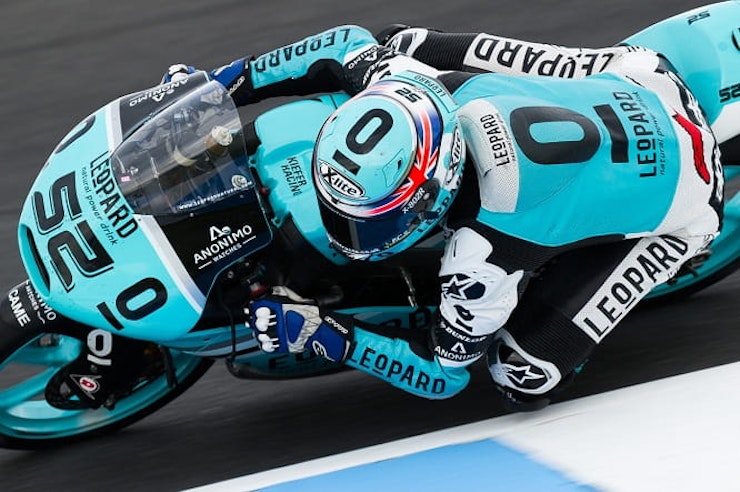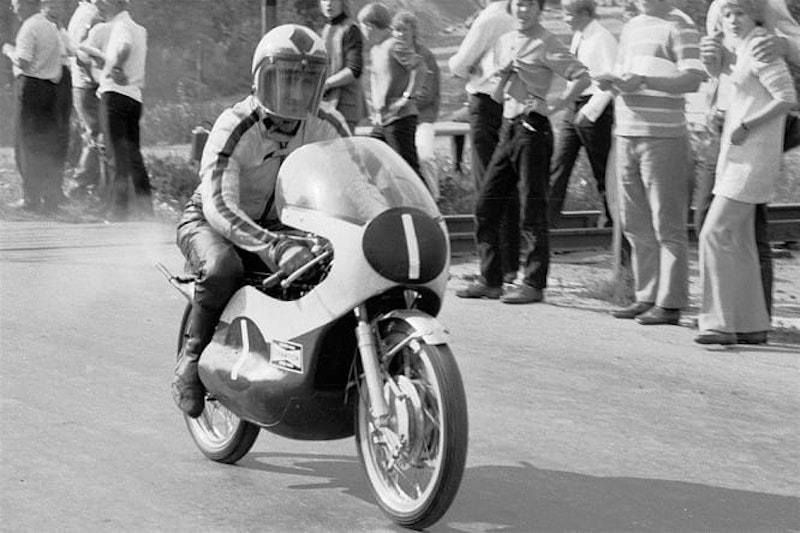Author: Stuart Barker Posted: 20 Oct 2015
Should Danny Kent manage to lift the Moto3 world championship this year he'll be the first Brit to do so in 46 years. This is the incredible story of Dave Simmonds – the Brit who blazed the trail for Danny Kent to follow.
Much has been made of the long-standing records Danny Kent will break if he manages to win this year's Moto3 world championship. But while many point out that he will be Britain's first Grand Prix world champion since Barry Sheene in 1977, the more relevant fact is that he will be our first champion in the 125cc/Moto3 class since 1969.
Although it was called the 125cc world championship back then, the series has continued uninterrupted, despite undergoing a name-change to Moto3 in 2012. Regulations have changed too, meaning that all bikes are now 250cc, single-cylinder four-strokes as opposed to the twin-cylinder two-strokes of 1969. But it's still the same series that has continued uninterrupted since the advent of world championship racing in 1949.
Incredibly, it's been almost fifty years since a British rider won the title so Danny Kent really will be bringing home a long-lost prize to British motorcycling. He will also bring the often forgotten name of Dave Simmonds back into the limelight where it so rightly belongs, because Simmonds was a one-man championship-winning machine who drove himself all round Europe, did all the work on his own bike, and gave Kawasaki its first ever world title in the swinging summer of 1969.
Simmonds was born in London on October 25, 1940 and made his race debut on a 50cc Itom in 1960. By 1963 he was British 125cc champion and he followed this up with a 250cc British title in 1965. Kawasaki invited the young Brit out to Japan to ride its works 125cc KA-1 in the Japanese Grand Prix in 1966. Simmonds finished a creditable 8th on the under-powered machine and was keen to race it in a full world championship campaign but Kawasaki insisted it did not have the budget to send staff and mechanics to compete in Europe. Simmonds suggested that if Kawasaki would loan him the bike, he would do all the mechanical work on it himself. Kawasaki was not convinced and it was only after Simmonds had attended a training course at the factory that Japanese bosses realised he was actually more than capable of doing so.
So Simmonds came back to the UK armed with a factory KA-125 that was hopelessly outpaced by the four-cylinder Yamahas and Suzukis of the time, and a very small box of spares that included two crankshafts, four pistons, a few sets of piston rings and not much else. Simmonds planned to drive himself all around Europe to compete in Grands Prix; he would also do all his own spannering and, of course, race the bike in all 11 rounds of the world championship. Not exactly a full factory effort. Besides, Kawasaki had all but given up any hope of winning even a single GP race with its KA-1, let alone a world championship. Simmonds was on his own.
Reliability issues and injuries plagued his 1967 and '68 seasons but by 1969, there was a ray of light. Not only had the dominant Yamaha and Suzuki factories pulled out of GP racing, but the regulations had changed to limit 125cc machines to two cylinders. Suddenly, Simmonds stood a chance of being competitive, even on his ageing Kawasaki.
A lack of start money meant he was forced to sit out the first round of the 1969 125cc world championship in Spain but at round two at Hockenheim Simmonds came into his own and gave Kawasaki its first ever Grand Prix win. He never looked back. In June he also became Kawasaki's first ever TT winner, taking the 125cc Lightweight 125 race when the TT still counted as the British round of the world championship. From there Simmonds went on to totally dominate the championship, taking eight wins and two second places from the 11-round series (his only non-score being the first round that he never contested). Simmonds ended the season as Kawasaki's first ever world champion and the last British rider to win the 125cc world championship.
The old 125 Kawasaki was totally outpaced in 1970 but Simmonds still managed to finish fourth in the world championship and in 1971 he moved up to the 500cc class (the equivalent of today's MotoGP) and gave Kawasaki its first ever win in that class at the final round at Jarama in Spain. It was enough to give him fourth place overall in the championship that was won by Giacomo Agostini on the dominant MV Agusta.
Simmonds last GP was at Montjuich Park in Barcelona in 1972 where he finished fourth in the 125 class and second in the 500s. Just a few weeks later, tragedy struck at a non-championship meeting at Rungis near Paris. When Australian racer Jack Findlay's caravan went on fire, Simmonds and fellow racer, Billie Nelson, ran to help, but when a gas canister caught fire and exploded, Simmonds was engulfed in the resultant fireball. His wife, Julie (daughter of Sidecar racer Bill Boddice), ran into the inferno to drag her husband out and suffered severe burns that put her on the critical list for several months. She would eventually recover but sadly her heroic actions were not enough to save her husband who had been killed in the explosion.
Dave Simmonds will forever be remembered as the man who put Kawasaki on the map, giving the firm its first GP race win, its first world championship, its first TT win, and its first 500cc GP win. And he did it all out of the back of a van with only himself for company. The world of Grand Prix motorcycle racing has changed beyond recognition since then but Danny Kent stands on the brink of finally bringing back the title that the late, great Dave Simmonds won for himself, Kawasaki, and his country, 46 years ago.
or !
Share on social media:

